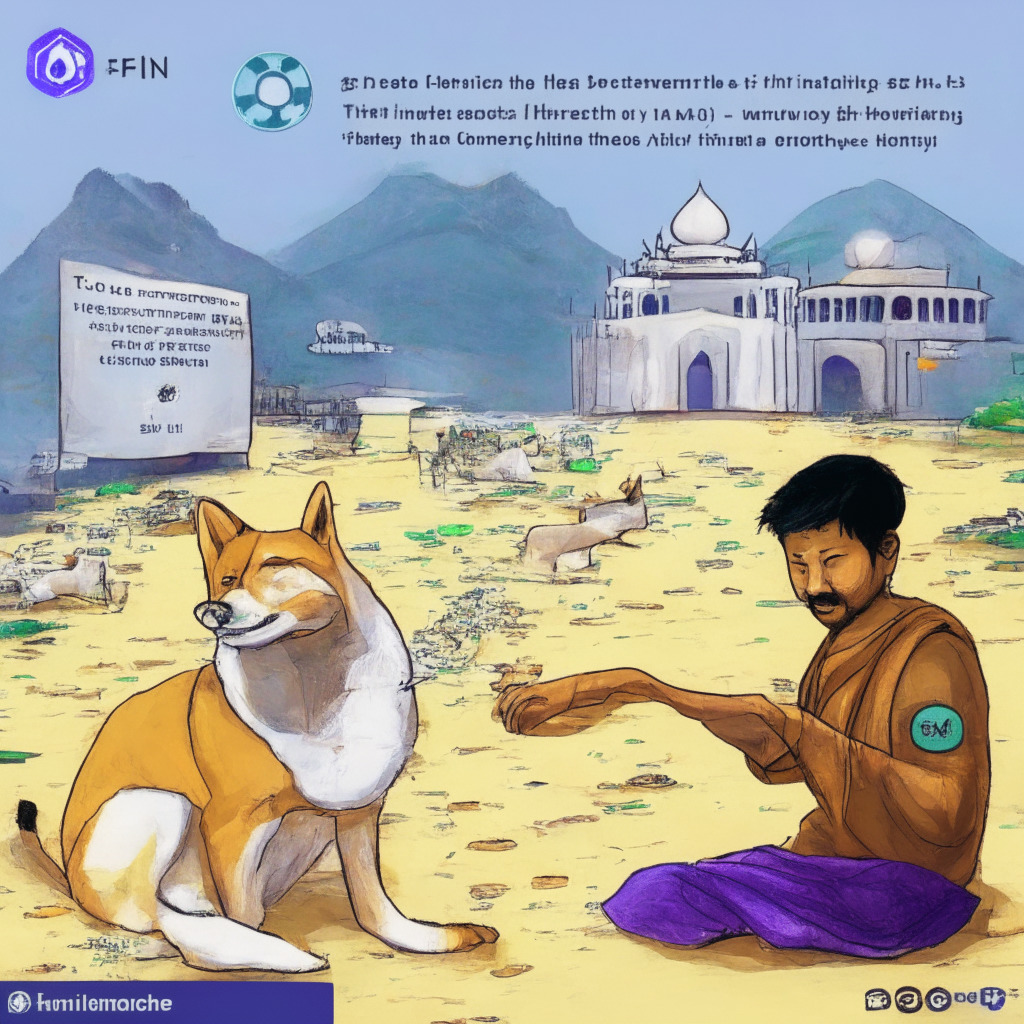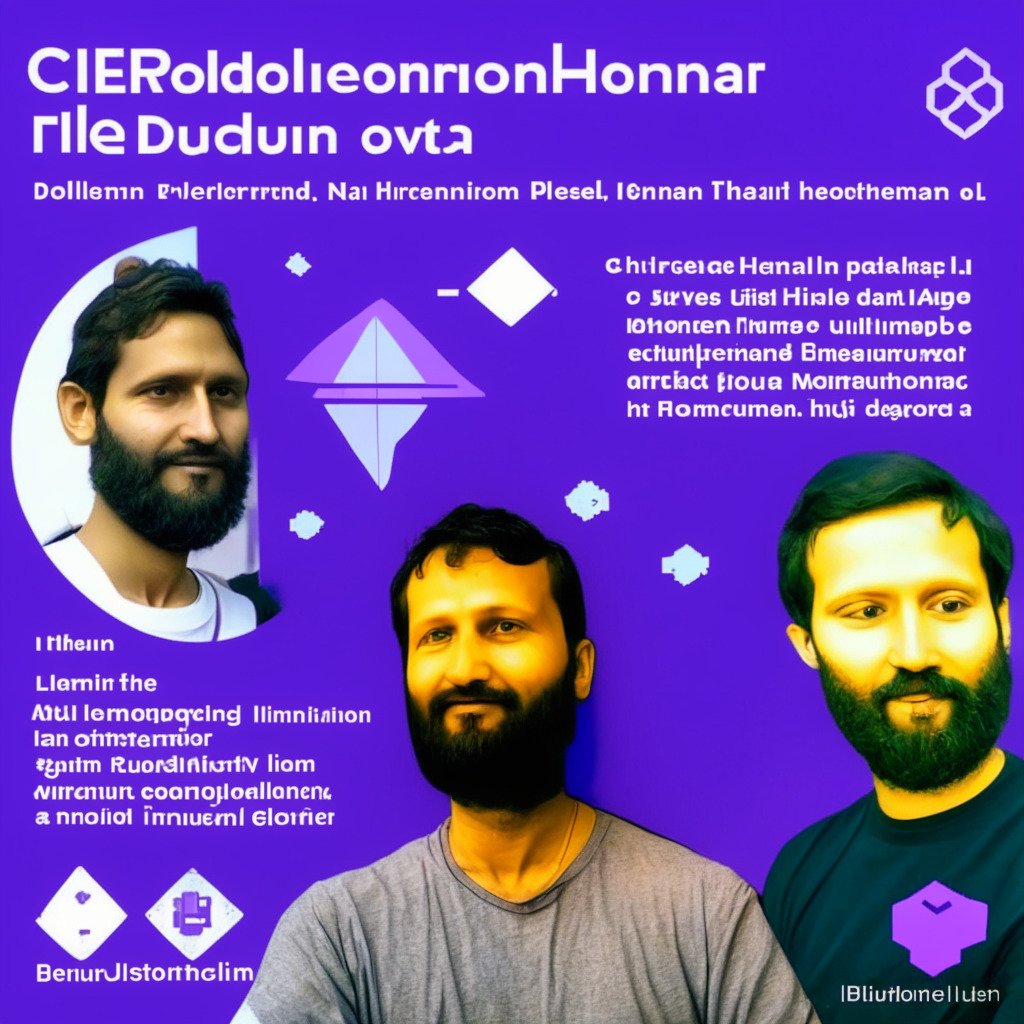“Ethereum co-founder, Vitalik Buterin, deposited around $1 million worth of Ether into Coinbase amidst Ether’s 10% market slump. Further intriguing is his withdrawal of $1.6 million worth of Ether, which raises questions about his confidence in the decentralized system versus traditional exchange avenues. “
Search Results for: vitalik buterin
Merging Finance and Blockchain: eToro’s Radical Shift versus Elon Musk’s Risky Maneuvers
“Yoni Assia, eToro’s co-founder, embraced financial technologies to democratize trading. eToro, under his steer, simplified brokerage account set up, enabling users to start trading swiftly. Influenced by programmer Vitalik Buterin, eToro introduced Bitcoin trading, aiding in a blockchain industry transformation.”
Exploring Restaking: Boosting Innovation or Threatening Ethereum’s Security and Consensus?
‘Restaking’ is an emerging concept that is transforming the cryptographic landscape, paving the way for Etherum stakers to earn additional income. However, while it presents an opportunity to extend Ethereum’s decentralized trust to various systems, it also poses potential systemic risks to the ecosystem, highlighted by Ethereum co-founder, Vitalik Buterin.
Shifting the Gaming Landscape: Immutable zkEVM and the Unpredictable World of Crypto
Immutable’s zkEVM, a Ethereum-compatible gaming platform developed with Polygon Labs, has begun public testing. This platform uses zero-knowledge proofs to secure transfers, decreasing development costs and enhancing security. However, Ethereum founder Vitalik Buterin warns it may cause data inefficiency and latency issues.
Dealing with Economic Descent: Lessons from Crypto’s Collapse and Potential for Revival
“Crypto’s potential to facilitate democratic, innovative online governance clashes with reality of insiders controlling power. Post-Terra-Luna collapse, Ethereum co-creator, Vitalik Buterin, proposed deposit insurances for protocols to gain user faith, yet transparency demands often go unmet. Ultimately, crypto’s potential remains boundless, yet trusting implementation is crucial.”
Unmasking Worldcoin: The Human-AI Interface and the Quest for Proof-of-Personhood
Worldcoin, a new crypto project, operates on the principle of proof-of-unique-personhood to prevent deep-fake bots. Despite rapid engagement, concerns about potential Orwellian surveillance and exposure of sensitive biometric data have arisen. Advocates argue that the collected data is converted to untraceable hash codes and no raw human data is stored. Ethereum founder Vitalik Buterin underscored the risk of centralized models not fully safeguarding data.
Balancing Act: Privacy, Security and Accessibility in Worldcoin’s Verification System
“Vitalik Buterin, co-founder of Ethereum, has expressed concerns over Worldcoin’s new human identity verification system. It uses iris scanning to provide proof of humanity, potentially preventing AI bot abuse. However, Buterin highlights potential risks, including the invasive nature of iris scanning and issues of privacy, security, and accessibility.”
Worldcoin’s Future: Privacy Concerns, Dubious Investors and Potentially Revolutionary Tech
The Worldcoin project, co-founded by OpenAI’s Sam Altman, uses a hardware unit called the Orb for identity verification by iris scanning. Despite initial success, criticism has piled up around privacy, centralization, security concerns, and questionable marketing strategies. Ethereum co-founder, Vitalik Buterin and crypto influencer ZachXBT have voiced concerns about potential misuse and exploitation.
Navigating Through Bitcoin’s $30k Intersection: The Impending Impact of Scaling Solutions
“Ethereum’s co-founder, Vitalik Buterin, underscored the necessity of scaling solutions for Bitcoin to supersede its current role as a mere payment option. Buterin advised using second-layer scaling solutions like ZK Rollup to improve Bitcoin’s sluggish transaction volume and improve its scalability.”
Ethereum’s Scalability Solutions: A Benchmark for Bitcoin or a Cause for Unique Pathways?
“Ethereum’s co-founder, Vitalik Buterin, believes that Bitcoin’s network needs to experiment with scalable solutions like zero-knowledge (ZK) rollups to grow beyond just a payment network. In contrast to Ethereum’s active experimentation with layered solutions, Bitcoin’s scalability focuses on its layer-2 solution- the Lightning Network.”
Kakarot Testnet: A Game Changer for Starknet and Ethereum EVM Compatibility?
Starknet’s upcoming Kakarot testnet, launching in August, aims to achieve Ethereum Virtual Machine (EVM) compatibility for the layer-2 scaling solution. Backed by prominent figures like Vitalik Buterin, this development seeks to remove hurdles for developers and improve rollup performance in the Ethereum ecosystem.
Ethereum Co-founder’s Connection to Prometheum: Overzealous Scrutiny or Valid Concern?
The connection between Ethereum co-founder Vitalik Buterin and Wanxiang Blockchain Labs has re-entered the spotlight due to Prometheum, a firm partly owned by Shanghai Wanxiang Blockchain and praised by SEC Chairman Gary Gensler for regulatory compliance. This connection raises questions about the intricate relationships between crypto companies and their founders, impacting the industry’s push for regulatory acceptance.
Unveiling the XRP Lawsuit’s Secrets: Impact on Crypto’s Future and Judicial Impartiality Debate
The recent disclosure of Ethereum founder Vitalik Buterin’s involvement in ex-SEC director Hinman’s controversial speech has raised concerns about potential biases in the XRP lawsuit. Despite these speculations, attorney John Deaton vouched for District Judge Analisa Torres’ impartiality. The situation stresses the importance of transparency and unbiased decision-making in addressing regulatory concerns surrounding cryptocurrencies.
Ethereum’s Future Hinges on Scaling, Wallet Security, and Privacy: The Critical Triad
Ethereum co-founder Vitalik Buterin emphasizes the need for three major technical transitions to ensure Ethereum’s success: layer-2 scaling, wallet security, and privacy-preserving features. These transitions aim to enhance user experience without sacrificing crucial components while promoting mass-market adoption and addressing technical and practical hurdles.
Ethereum’s Future: Scalability, Security, and Privacy – Crucial Transitions and Challenges Ahead
Ethereum co-founder Vitalik Buterin emphasizes three critical transitions poised to reshape Ethereum’s future, focusing on enhancing scalability, security, and privacy. Key changes include Layer 2 scaling solutions like rollups, wallet security through smart contract wallets, and increased privacy with features like stealth address methods. Coordination among stakeholders is essential for the platform’s success.
Ethereum’s Three Transitions: Tackling the Blockchain Trilemma for a Brighter Future
Ethereum’s co-founder, Vitalik Buterin, emphasizes the need for addressing “The Three Transitions” – L2 scaling solutions, smart contract wallets, and enhanced privacy, to ensure Ethereum’s growth and future success. Overcoming the “blockchain trilemma” is crucial in maintaining user confidence, trust, and fostering mass adoption.
Ethereum and Polygon Co-founders Unite for Covid Research: Exploring Blockchain’s Humanitarian Potential
Ethereum co-founder Vitalik Buterin and Polygon co-founder Sandeep Nailwal collaborate to support additional Covid-19 research projects through Nailwal’s Crypto Relief fund. The focus includes understanding long Covid and improving air filtration and ventilation in buildings, recognizing the potential of cryptographic methods and funds for global well-being.
Ethereum Co-Founder’s $10M Donation: Striking Balance Between Philanthropy and Market Stability
Ethereum co-creator Vitalik Buterin donated an additional $10 million to India-focused coronavirus prevention initative CryptoRelief. This is part of a new $100 million tranche of donations aimed at tackling the pandemic, generated through Shiba Inu token sales. The situation highlights the philanthropic potential of cryptocurrencies, while raising questions about their impact on market dynamics.
Ethereum and Polygon Co-founders Tackle India’s COVID-19 Crisis: Potential and Challenges
Ethereum co-founder Vitalik Buterin and Polygon co-founder Sandeep Nailwal collaborate with India-based Crypto Relief to send $100 million towards COVID-19 research and development of medical infrastructure in India. Ensuring effective fund distribution and navigating legal complexities will be crucial for achieving desired outcomes.
Ethereum Co-Founder’s Massive $41M ETH Sale: Impact on Price and Market Speculation
Ethereum co-founder Jeffrey Wilcke transferred 22,000 ETH ($41.13 million) to Kraken, fueling speculation of a significant ETH price drop. This follows previous large-scale ETH sales by the Ethereum Foundation and co-founder Vitalik Buterin, creating uncertainty in the crypto community.
Ethereum’s Journey: Reshaping Finance, Debating Principles, and Navigating Challenges
Ethereum has evolved into the most active blockchain, supporting novel financial systems and reshaping future payment methods. Despite co-creator Vitalik Buterin’s concerns of a “dystopian future,” Ethereum has demonstrated remarkable flexibility and foresight, adapting to challenges and pushing technological boundaries in finance and technology.
Zuzalu: Revolutionary Crypto-Futurist Gathering or Exclusive Utopian Dream?
Zuzalu, a “pop-up city community” founded by Ethereum co-founder Vitalik Buterin, hosted discussions on cryptocurrency, blockchain, AI, and human longevity. Attendees explored human potential, but the event sparked debates on whether it’s paving the way to a new civilization or simply an eccentric gathering.
Ethereum Co-Founder Praises Solana: Scalability Showdown and Market Implications
Ethereum co-founder Vitalik Buterin acknowledges Solana as the most scalable blockchain, implying its superiority over Ethereum. Solana leverages Proof-of-History and Proof-of-Stake for faster, more secure transactions, addressing Ethereum’s scalability struggles, network congestion, and excessive gas fees.
Ethereum Consensus: Balancing Validator Roles and Security Risks Beyond the Merge
Ethereum co-founder Vitalik Buterin cautioned against extending Ethereum’s consensus beyond essential functions like validating blocks and securing the network. He highlighted that expanding consensus “duties” increases costs, complexities, and risks, potentially exposing the ecosystem to security vulnerabilities or 51% attacks. Buterin advocated for a minimalistic approach and assisting developers in finding alternative security methods.
Ethereum Update Boosts Compatibility & Pruning: Addressing Scalability and Decentralization
Ethereum client Nimbus released an update (v23.5.1) enhancing network compatibility and supporting incremental pruning in response to recent finality issues. The update aligns with Vitalik Buterin’s Ethereum roadmap, allowing nodes to shed older data and improve network performance, scalability, and decentralization.
Visa Tackles Ethereum Account Abstraction & ERC-4337: Revolutionizing Crypto Payments
Visa explores Ethereum Account Abstraction and ERC-4337 for secure automatic recurring payments and potential gas fee redesigns. This aims to improve user convenience and enable seamless digital transactions in crypto onboarding experiences. Ethereum co-founder, Vitalik Buterin, supports these innovations for self-custodial wallets.
Ethereum Creator’s Wallet Activity Sparks Market Speculation: Impact and Concerns
A wallet linked to Ethereum co-founder Vitalik Buterin transferred 3,500 ETH worth $6.56 million, sparking rumors of a possible sell-off. No official confirmation exists, and the impact of such a move remains uncertain. It’s crucial for investors to conduct thorough research before investing in the rapidly evolving cryptocurrency landscape.
Massive Crypto Selloff: Analyzing the Impact and How to Navigate Market Volatility
The global crypto market cap decreased by 2.60%, with over $182 million worth of crypto assets liquidated in 24 hours. Ethereum creator Vitalik Buterin selling 15,000 ETH is cited as the potential trigger for the crypto market selloff. Investors must conduct thorough market research and consider long-term prospects before making investment decisions in cryptocurrencies.
Ethereum Defies Crypto Market Trends, PEPE Frenzy Impacts Gas Fees: Opportunity or Warning?
Ethereum (ETH) sees a 3.56% price increase, possibly breaking the $2,000 mark, as active deposits on the Ethereum blockchain hit a 1.5-year high. The PEPE memecoin frenzy drives Ethereum’s daily median gas fee to a 12-month high, showcasing its ability to decouple from the crypto market. Be cautious; Vitalik Buterin and Ethereum Foundation offloaded 15,000 ETH, potentially indicating a sell-off.
Ethereum Staking Surge Sparks Centralization Concerns: A Deeper Dive into JPMorgan’s Analysis
The article reveals Ethereum’s staking growth is leading to increased centralization, with five entities controlling most staking activities. This generates risks like potential single points of failure and lower staking yields. Analysts suggest this centralization might challenge blockchain networks’ decentralization and trustlessness principles.
Cybersecurity vs User Experience: Harmonizing the Dual-edged Sword of the Crypto Space
The recent SIM-swap scams targeting Friend.tech users signify a trade-off between user experience and enhanced security in the crypto-space. Such scams, exploiting cell phone numbers to loot the victim’s accounts, contributed to heightened cybersecurity concerns. Security firms suggest enforcing two-factor authentication and removal of phone numbers from social media accounts as potential solutions.
Unmasking Filecoin: Blockchain Sleuths, Dubious Activities, and Investor Deception
Investigator @BoringSleuth’s report pointed out inconsistencies in the source of blockchain initiative, Filecoin’s ICO. It suggests a potential scheme intended to deceive investors by mimicking widespread investor interest. The verity of these claims remains unproven but they have raised important questions regarding transparency in the crypto realm.































